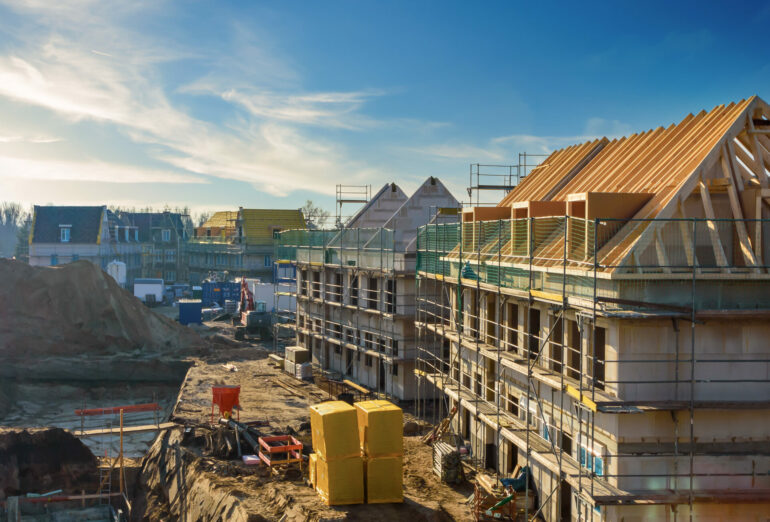The Planning and Infrastructure Bill has had its first reading in the House of Commons today, as the Government aims to speed up the construction of homes and other key infrastructure.
The passage of the bill aims to support the building of 1.5 million homes and essential projects like roads and railways.
The reforms also form part of the Government’s plan to enhance energy security with homegrown power and boost living standards.
Key measures include creating a national scheme of delegation for planning decisions, establishing a Nature Restoration Fund, and reforming compulsory purchase rules.
Development corporations will be strengthened to support large-scale projects, while a system of strategic planning will ensure coherent development.
The bill also seeks to streamline processes for National Significant Infrastructure Projects.
Deputy Prime Minister, Angela Rayner, said: “We’re creating the biggest building boom in a generation – as a major step forward in getting Britain building again and unleashing economic growth in every corner of the country, by lifting the bureaucratic burden which has been holding back developments for too long.
“The Planning and Infrastructure Bill will unleash seismic reforms to help builders get shovels in the ground quicker to build more homes, and the vital infrastructure we need to improve transport links and make Britain a clean energy superpower to protect billpayers.”
Rayner added: “It will help us to deliver the 1.5 million homes we have committed to so we can tackle the housing crisis we have inherited head on – not only for people desperate to buy a home, but for the families and young children stuck in temporary accommodation and in need of a safe, secure roof over their heads.”
“These reforms are at the heart of our Plan for Change, ensuring we are backing the builders, taking on the blockers, and delivering the homes and infrastructure this country so badly needs.”
Reaction:
Mark Reynolds, executive chair of Mace Group:
“For too long the UK’s planning systems have inhibited growth, with layer upon layer of checks and balances stifling productivity, confidence, investment and jobs.
“These proposed changes show this government is listening to industry and taking reform seriously; recognising that new homes and infrastructure are necessary to inject life into the economy.
“Our construction industry is ready to meet the challenge, and the measures highlight how mindful growth can support communities and our net-zero ambitions.
Neil Jefferson, chief executive of the Home Builders Federation:
“The swift moves to address the failings in the planning system are a very welcome and positive step towards increasing housing supply.
“Removing blockages, speeding up the decision-making process and ensuring local planning departments have the capacity to process applications effectively will be essential to getting more sites up and running.
“If the other constraints currently preventing house builders delivering more homes can be tackled, the changes made to planning will really allow output to accelerate.”
Brian Berry, chief executive of the Federation of Master Builders:
“The new Planning and Infrastructure Bill is a crucial first step in getting Britain building again.
“In the 1980’s around 40% of new homes were built by SMEs, yet today that figure is around 10%.
“Small builders across the UK stand ready to play their part in delivering the homes we need, but time and time again we’ve seen barriers keeping them out of the market.
“We know from research carried out by the FMB that around three quarters of small builders view the planning system as the number one issue holding back the delivery of new homes, while lack of viable and available land are also major challenges.
“Supporting small builders through the planning system and reducing unnecessary bureaucracy will be key to opening up small sites, and today’s announcement will be welcomed by many across the industry.”
Kate Henderson, chief executive of the National Housing Federation:
“At a time when the housing crisis continues to blight lives across the country, it’s welcome to see the introduction of this bill.
“With more than 160,000 children in temporary accommodation, it’s never been more urgent to build the social homes we need.
“Planning reform is an essential part of solving the housing crisis, and a return to strategic planning is welcome.
“A focus on certainty and enabling local areas to work together to plan for the homes, jobs and infrastructure needed in communities will ensure every area benefits from growth.
“Measures to reform compulsory purchase orders in the bill are also welcome, and will support the delivery of affordable housing and other local infrastructure such as GPs and schools.”
David Thomas, chief executive of Barratt Redrow:
“It has been clear from day one that government is serious about tackling the housing crisis, and it continues to take strong action to unlock stalled projects and reshape the planning system to deliver the high-quality homes and sustainable places the country needs.
“We share government’s ambition to build more homes, to create good quality jobs and to drive economic growth.
“We look forward to supporting them on this mission and will respond positively to the bold reforms set out in the Planning and Infrastructure Bill.”
Nathan Emerson, CEO of Propertymark:
“Propertymark welcomes the UK Government’s ongoing commitment to reform planning and infrastructure projects across the country and its ongoing focus on new housing to help ensure supply keeps pace with real world demand.
“The legislation must deliver an infrastructure-first approach towards building new homes ensuring there are improved transport links, adequate schools and medical centres, as well as focusing on building housing for an ageing population and homes that are net zero.
“The reforms must ensure a diverse mix of properties are delivered in the right areas at the right time and mean that local councils have the capacity and resources they need to deliver additional new homes.
“What’s key is that local knowledge is utilised effectively, and local democracy is fully considered and enhanced when it comes to planning decisions.”



